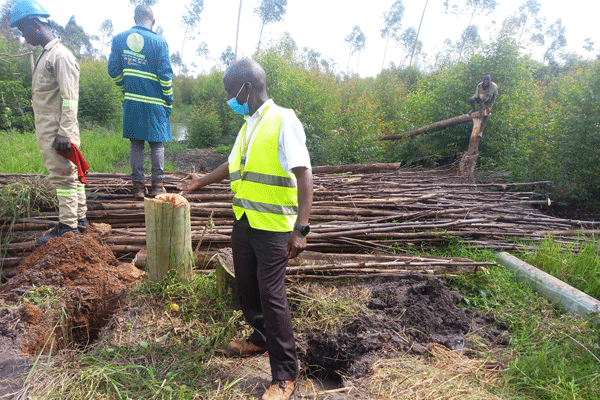Stealing electricity is not a good way to save money

Exercise. Umeme employees with some of the electric wires that they confiscated recently after an operation to curb electricity theft in Nateete, Kampala. PHOTO BY MICHAEL KAKUMIRIZI
What you need to know:
- Each power user should be the others brother’s keeper to protect especially the innocent, yet vulnerable who pay with their lives for the mistakes of others.
At the time of writing this, a community in Kasanje, Wakiso District, was still reconciling itself to the electrocution of three members of one household.
According to the Police, the first died as she hung damp garments on a metallic line, unaware it was energised.
The second perished as she yanked at the first (her sister) and the third, a six-year-old, after he touched the second – its mother.
Commiserations to the survivors. One account has it that the washing line was being used by another person to steal electricity.
There are self-employed yet unscrupulous electricians (kamyufus) out there who rig connections to the grid.
They take advantage of many potential electricity users desire for faster connection to the grid and others reflex to ‘save’ money.
The kamyufus do not care about ‘their clients’ safety but their hard-earned cash while ignoring the risks to lives.
Many of the deaths resulting from electrocution in places like Bugisu in eastern Uganda are unreported because it would confirm one was stealing electricity, a vice none of them – even in death – would want to be associated with.
Thus, it might be hard to say the exact number of deaths attributable to interference – by unauthorised persons – with the grid. But they are many.
So, there is need for concerted effort to prevent or reduce loss of lives resulting from interference with the power grid.
Individuals, communities should be on the lookout for pirate electricity wires and report such to the Police and the electricity distribution utilities like Umeme. Watching by as a neighbour steals electricity is like sitting in a room with someone exhaling tobacco smoke.
Both suffer the health consequences. As to those that steal power, if the fines and time in the coolers are not deterrent, the self-preservation instinct should count.
Similarly, Parliament, which is presently considering Ministries, Departments, and Agencies budget estimates for the 2022/2023 fiscal year should consider allocating even more funds to clear the free electricity connections backlog as well as to make fresh ones.
The good news is government is working towards reducing the retail tariffs for all the customer categories.
Truth is if you have more legal customers on the grid, the tariff can be as low as it could be as the distributor (s) can still benefit from the power of turnover of millions legitimate users.
And for this matter, that is why Umeme is fully supportive of the government aggressive access agenda.
And the government, which many consumers could be counting on to subsidise the tariff, might not be in position due to more pressing needs worsened by the Covid-19 pandemic.
That said, the current charges for electricity alone do not justify the theft of electricity as it would not explain why a person would risk life by illegally tapping power to save Shs20,000 monthly.
Nor does the prices rationalise why someone who grosses Shs200,000 monthly would spend Shs40,000 each month on an unscrupulous lines/wireman to illegally hook their premises to the grid.
Political and religious leaders, who are held in high esteem by many electricity users, should spread the word on the dangers of illegal connections.
Umeme is continuously supporting the establishment of safety clubs in some schools to educate pupils and students early about safety and is providing communities in need with insulated washing lines. It is also increasingly using insulated cables.
The House Committee on Natural Resources, which is now combing through the Electricity Amendment Bill, 2022, should support the proposed stiffer fines, penalties that will set those convicted of stealing power millions of shillings back to dull the appetite for stolen electricity.
Police should not relent in gathering evidence on the theft, identifying the market for the stolen electricity materials, apprehending the suspects and seeing their prosecution.
Each power user should be the others brother’s keeper to protect especially the innocent, yet vulnerable who pay with their lives for the mistakes of others.
Nelson Wesonga, Umeme Ltd




